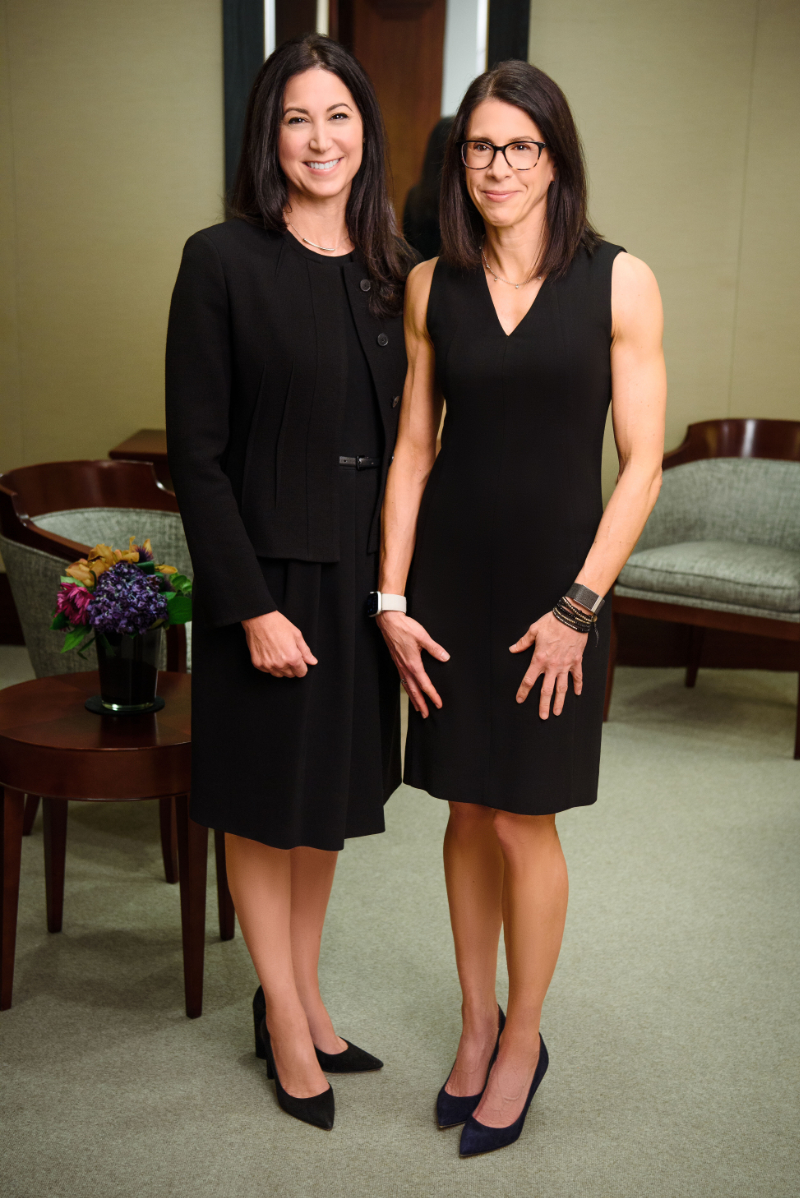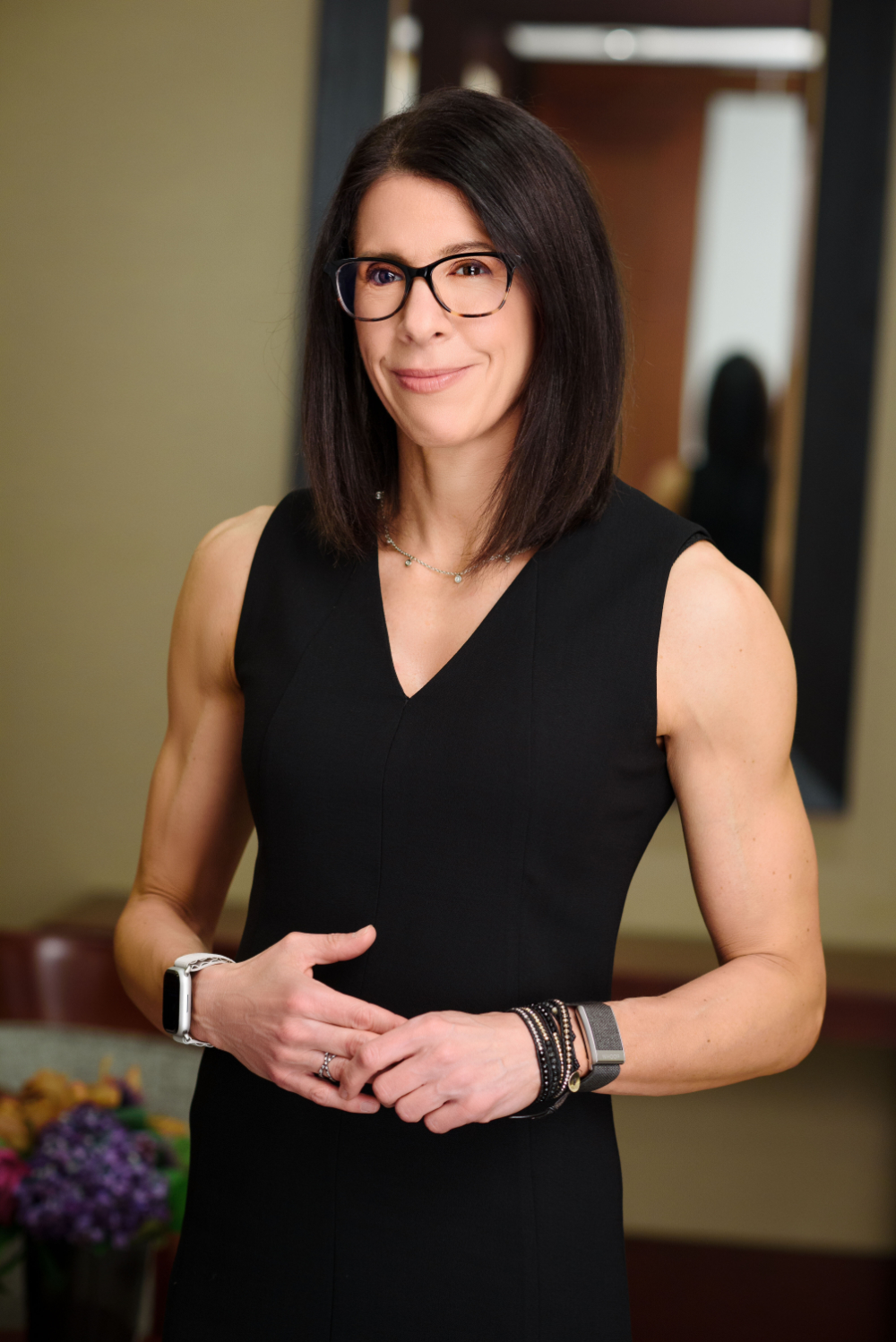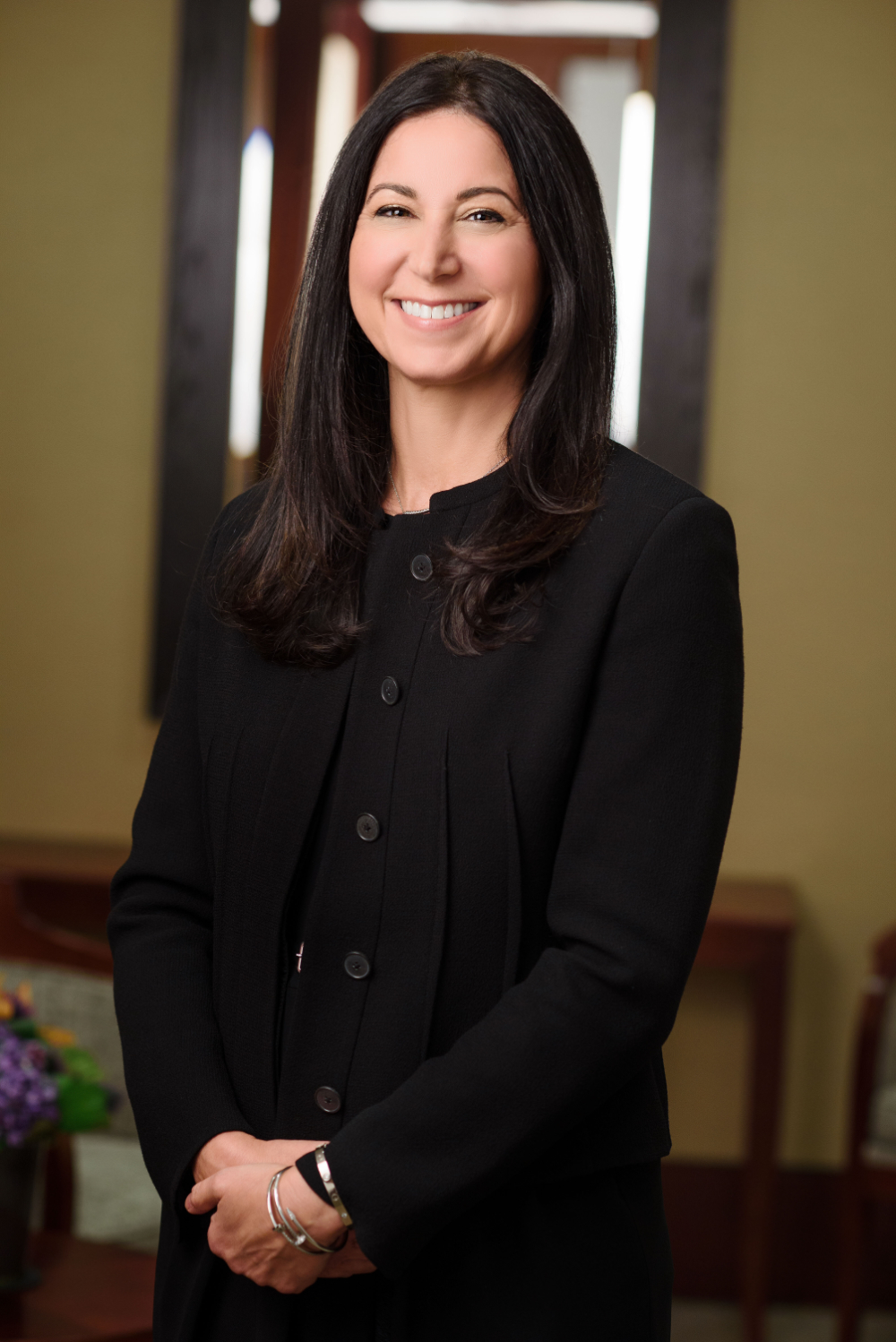Sister Act: Litigators Rachel Skaistis And Hannah Ross Headline Securities Law
By Emily Jackoway , Katrina Dewey | November 12, 2024 | Lawyer Limelights, Cravath Features, Bernstein Litowitz Features, News & Features

Photos by Nick Coleman.
In almost every aspect of their lives, sisters Hannah Ross and Rachel Skaistis are inseparable. As children, they shared a room in their small-town Pennsylvania home, where they were the oldest of six siblings. They’ve been living in the same apartment building in New York for over a decade, see each other nearly every day, raise their children together and go out for dinner whenever they get the chance.
Then, they go to work.
Partners at two of the most prestigious securities firms in the country, Ross and Skaistis each epitomize what it means to be a high-powered female litigator – on opposite sides of the “v.” At Cravath, Swaine & Moore, Skaistis advises and defends major multi-national corporations when they are investigated by regulators or named in securities fraud class actions. Meanwhile, at Bernstein Litowitz Berger & Grossmann, Ross focuses on investigating and prosecuting those securities cases on the shareholder side. In the past two decades, the pair have helped forge a path for women in the historically male-dominated world of securities law.
The two weren’t always on this parallel track. Ross started out as a criminal prosecutor in the Massachusetts Attorney General’s Office and an Assistant District Attorney in the DA’s office in Middlesex County, Mass., before joining Bernstein Litowitz in 2002.
As a partner and member of Bernstein Litowitz’s Executive Committee, Ross has steered massive actions to success, including recovering more than $2B for 35 institutional investors of the Allianz Structured Alpha Funds. Ross was also involved in a litigation against Bank of America which resulted in a $2.425B settlement – considered the largest recovery in a litigation arising from the financial crisis. In addition to her role as a litigator, where she has helped secure more than $7B for investors, Ross devotes a significant amount of her time to initial case identification and evaluation and advising clients on their potential options. She is also one of the senior partners overseeing the firm’s Global Securities and Litigation Monitoring Team, examining current non-US securities matters.
Skaistis, meanwhile, spent a number of years as a newspaper reporter before considering law school. In her reporting days, the crime beat was her favorite: “I really liked working with crime victims. So, I went to law school to be a prosecutor,” she says. At that point, she remembers, “I did not even know what a Big Law firm was.”
Since joining Cravath in 1997, Skaistis has made a name for herself in the defense bar. She is a vital resource to companies and their boards when she represents them in government and internal investigations, as well as shareholder and derivative actions and other business-critical litigation. In a high-profile global securities matter, Skaistis guided Telia Company through a Foreign Corrupt Practices Act investigation, which ended in a global resolution with the U.S. Department of Justice, the U.S. Securities and Exchange Commission, the Dutch Public Prosecution Service and the Swedish Prosecution Authority, without the need for a compliance monitor. Among many other matters, she has also advised a special litigation committee of the Board of Directors of Alphabet Inc. in connection with various shareholder legal proceedings related to workplace conduct and data privacy, and pharmaceutical companies Biogen and Novartis in False Claims Act and antitrust litigation, respectively.
Lawdragon: Looking back, how did you realize you were both heading down this same track?
Rachel Skaistis: It’s funny, I don't think we were until much later in life.
Hannah and I are from a family of doctors, and that was inspirational. When I started college, I was pre-med. Then, I switched to an English major when I realized that is where my talents are, and I worked as a reporter for a number of years. Law school was never even on my radar, and, at the time, it never occurred to me that Hannah would want to be a lawyer, either.

Hannah Ross: Our dad is an oncologist, and our mom also works as a counselor to families who are dealing with cancer and grief. They’ve always stressed to us the need to help people, so that was something I always saw in a future career.
I volunteered at the rape crisis center at college. I felt like I was making a difference in the victims’ lives, and I wanted to continue making sure their voices were heard. So, I went to law school to be a prosecutor.
I worked at the rape crisis and domestic violence hotline in law school, as well. When I graduated, I worked at the DA’s office in Middlesex County, Mass., and spent several years as a criminal prosecutor. I loved it. I was out there every day helping victims seek justice.
LD: How did you come to Bernstein Litowitz?
HR: Rachel was pregnant with her eldest, and my five siblings were all in New York City at that time. So, I realized, “Wait a minute. I want to be in New York.”
I looked into DA offices, but I also thought, “Well, maybe I should look at a private firm.” Both Rachel and a headhunter I was working with suggested Bernstein Litowitz because they felt the firm’s values and practice areas would really align with what I was focused on, which was helping people who felt they had been aggrieved.
I interviewed here, met all the partners, and thought, “This is where I want to be.” And here I am, over 22 years later.
LD: Amazing. And Rachel, you were very supportive of Hannah going to the other side.
RS: Absolutely. Everybody needs counsel, and we are not doing our jobs as a profession if you don’t have that. I think very highly of Bernstein Litowitz, in part because Hannah has had a fantastic experience there. So, yes, I was very supportive.
LD: What was your path to Cravath?
RS: I worked at the Manhattan DA’s office for a summer, and I was thinking seriously about going to a U.S. Attorney’s Office. At least back then, it was important to have experience in a firm before you applied for that particular job. I had a clerkship two years out, so I thought I would come to Cravath for two years.
To my total surprise even today, from the day I started working here in September 1997, I found this work exhilarating. I absolutely love the work, the firm, the people. I did leave to clerk, for Judge Shira Scheindlin in the Southern District of New York, which was an incredible experience, but I came right back. I never thought about doing anything else.
LD: Have you always been in investigations and corporate governance?
RS: No. At Cravath, we are all generalists in the Litigation Department. So, through almost all of my associate career and my first three years as a partner, I did traditional litigation of all sorts. I think I worked on my first significant SEC matter in 2008.
I'm also in the firm’s Office of General Counsel, and I do a lot of our employment-related work internally and for clients, and that involves a lot of investigations. So, over the past 10 to 12 years, investigations have become a focus of my practice.
LD: And Hannah, you have the same sort of practice, just on the flip side.
HR: Yes. We’re focused on and constantly investigating shareholder and investment-related cases. Because we do not get discovery until our complaints are sustained, and often do not have access to any of the company’s internal information, we have to build our cases from the ground up and do our own investigations, which I’ve always loved doing.
I’ve had the honor of working on some groundbreaking and historic cases during my time here. But over the past couple of years, I’ve been much more focused on the case identification and evaluation side. We’re analyzing potential cases and advising our clients on their options to protect their interests. We want to make sure that our advice and recommended approach addresses the merits of the potential case as well as each client’s particular needs and litigation preferences.
At family dinners Hannah is more able to talk about cases than I am. So, I think my family has a slightly skewed view of who is more active in practice.
LD: So, how does it work with the two of you when your firms are working on opposite sides of a case?
RS: Both of us take our ethical and confidentiality obligations to our clients extremely seriously. If she ever gets a work call and I’m there, I’ll step out or she’ll walk out. When we’re on car trips together, we’re not talking to anybody on the phone.
Occasionally we know what the other is working on because the matter is public, but nothing non-public or sensitive. We stay so far away from that line. It does sometimes mean that at family dinners Hannah is more able to talk about cases than I am. So, I think my family has a slightly skewed view of who is more active in practice.
LD: Right. And you’re like, “Could you pass the bread, please?”
HR: That is one of the advantages of a lot of the cases that we’re working on: Almost everything I do is public. So, I am much more able to talk about my work.
LD: It must be challenging, since you have, for the most part, shared the vast majority of your life on a daily basis. You must be very attuned to not going there when it comes to work.
RS: Yes, absolutely. I always tell my clients about her whenever I get on a case, and they are always fantastic about it. We’re both very proud of each other, so we are always happy to disclose that information, but we are really careful.
HR: That’s right. When I joined Bernstein Litowitz, Rachel was working on a case that our firm was opposite, so we have dealt with this from the moment I started.
LD: This also gets at a deeper issue: the “good guys” versus “bad guys” idea. You’re both leaders in your firms, and your firms are great at what they do. But neither of you is fighting each other. You’re just both at the top of your game with top firms.
RS: One hundred percent; there is a lot of professional respect between each other and our firms.
LD: For each of you, what are you proudest of accomplishing in your career – and what are you proudest of your sister for accomplishing?
HR: Thinking back to when I first joined the firm, I came from a criminal prosecutor’s background and had very little substantive knowledge about this practice area. It was a steep learning curve for me. I’m proud of what I’ve accomplished in terms of the cases I’ve worked on and the clients that I’ve been able to represent since then.
I’ve gotten here through incredible mentors at the firm, many of whom I still work side-by-side with to protect the interests of injured investors and lead our firm. I have also been fortunate to have very strong role models, and Rachel was a tremendous role model for me. I am so thankful for all the women, including Rachel, who brought me to where I am today, and I hope that I’m able to help other women lawyers at the firm as they advance in their careers.

RS: I have to jump in and say that Hannah really started doing this kind of litigation later than most people. I could not have been prouder when she became a member of the Executive Committee.
HR: And I think that Rachel is incredible because when you are a lawyer in New York, and probably a lawyer anywhere in the U.S., you know Cravath. I remember when she got her offer to join Cravath as an associate, and I remember when she made partner. I remember all of these incredible milestones, and now she’s serving in the general counsel’s office and leading tremendous litigation. I’m extraordinarily proud of her, but not at all surprised.
RS: That’s really sweet.
LD: Rachel, what are you proudest of?
RS: I am proud that I have gotten to a point in my career where I have established my own way of practicing. As Hannah said, I have had the privilege of working with such amazing lawyers, and I’ve gotten to learn from so many litigation styles. But it is nice to get to a point where you feel like you have found a style of practicing and advising your clients that is true to who you are.
LD: And then you’re both involved in pro bono work, as well?
RS: Yes. I have been involved in a lot of our pro bono programs, which mostly means supervising our associates’ terrific pro bono work. I'm always incredibly moved by how much pro bono work our associates want to do on top of everything else, and it truly is an integral part of who we are as a firm. So, I feel like I absolutely owe it to them to be a supervisor on as many cases as they want to do, in all different areas. I love that they are willing and really wanting to take on that work.
And as a Co-Chair of our Diversity Committee, I am really proud of the firm’s efforts in this area, as well. I have been at Cravath for so long and have gotten to watch as we grow, learn and evolve. Seeing the number of phenomenal women and diverse lawyers explode over the time that I’ve been here has also been gratifying. It feels like home.
HR: Jumping off of that, I think one of the reasons we have been able to be so successful, both professionally as well as in our families, is we’re both at firms that value personal lives – while obviously making sure that you’re doing your work and doing everything you need to do for your clients.
At Bernstein Litowitz, family has always been so important to Max [Berger], the founding partner, and my fellow senior partners. They know it’s going to make you a better lawyer if you have a fuller life.
RS: I agree with that completely. I had my oldest daughter when I was a fifth-year associate, and I was completely supported – if you are at a firm that values family, it can absolutely be done.
LD: What kind of evolution have you seen over the course of your career in terms of that becoming more of the norm?
RS: It has been a huge evolution for sure. When I started, you focused on the work. If I was going to an event at my daughter’s school, I would just say I was “out of pocket.” But the truth is, people are terrific about it. It makes you more human to colleagues and to clients. And the younger generation coming in wants to know that you can do this job and have a life.
That balance is part of why I feel good about where I am now. I work really hard. I am absolutely there when my clients need me. But I love my family, I love my kids and I love my sister. And if we can both sneak out early and grab dinner on a Friday, we are absolutely going to do that.

